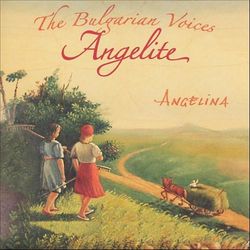The Bulgarian Voices: Angelite - “Angelina” CD Review
Tagged with: Angelite Bulgarian Voices Angelina Jaro Bulgaria Polyphonic Choir Georgi Petkov Theodosii Spassov Ivan Spassov Stoyan Yankulov World Music WorldMusic.co.uk Glyn Phillips Review CD Kaval tambura gadulka Huun Huur Tu Moscow Art Trio
"Angelite are fantastic singers, living instruments in fact."
The Bulgarian Voices: Angelite - “Angelina” (Jaro 4310-2)
Angelite come from the great Bulgarian tradition of large polyphonic female choirs, yet in this new (2013) album “Angelina” they show off their full range of styles, influences and vocal skills. The 20 singers demonstrate their mastery of Bulgarian song forms from characteristic harsh, dissonant yodels and yelps, to feisty folk songs in 12/16 and ⅝ rhythms, humorous ditties, lush ballads and love songs. Angelite are fantastic singers, living instruments in fact.
"intimate, measured and controlled"
Some moments are almost freeform and jazz-like (such as the track “Dva Tapana Biyat - Two Drums Are Beating”) and others are more intimate, measured and controlled such as the tale of unrequited love: “Ochi,Ochi - Eyes, Eyes”.
"ethereal, romantic and as delicate as lace"
“Vrabche - Sparrow” is a composition by Theodosii Spassov that uses a swaying beat that teeters on the edge of falling over, whilst the choir sing a particularly uplifting song in honour of the humble sparrow a piece of music that has a peculiar effect, promoting both well-being and care-free abandonment. And then there's the heart-string pulling love song “Leilinko, Kuzum Pilyanze - Leilinko, My Darling” which is ethereal, romantic and as delicate as lace.
 The album also showcases song-forms from various parts of Bulgaria, taking in folklore from the Karakachani people, Pirin, Shope and Thracian regions as well as taking in a mixture of songs extolling nature, the harvest, love, celebration, dance (horo), joy and sorrow.
The album also showcases song-forms from various parts of Bulgaria, taking in folklore from the Karakachani people, Pirin, Shope and Thracian regions as well as taking in a mixture of songs extolling nature, the harvest, love, celebration, dance (horo), joy and sorrow.
In particular Angelite utilise traditional south-east European instruments to complement their supple voices, such as the gadulka on the opening track (“Poistoi, Milo, Yasno Slanze - Please Wait Bright Sun”). This is a Bulgarian bowed instrument with three melodic strings and various sympathetic strings - not dissimilar to the North Indian kamanche and sarangi.
"quirky and heartfelt"
The beautiful track “Ta Nyata - Youth” from the Karakachani community of nomad mountain shepherds utilises the long-necked, heavy Bulgarian tambura (more like a bouzouki or mandolin and not to be confused with the Indian tambura). The 8 steel strings can be used to play both melodies and drones. This quirky and heartfelt song features the vocals of Velichka Chauseva over a trio of backing voices and Veli Chausev’s tambura and Stoyan Yankulov’s percussion. Yankulov also plays various drums and percussion throughout the album with the characteristic Bulgarian use of complex rhythms.
There are even Balkan bagpipes on the almost mediaeval sounding “Gaidine Sviriat - Bagpipes Playing”.
"extraordinarily magical quality of tone"
However, the most common instrument used on the album is the kaval, an end-blown flute with an extraordinarily magical quality of tone. It is found all over the Balkans and Anatolia (and further afield, although the Bulgarians are acknowledged masters) and is associated mostly with shepherding communities.
The kaval accompanies the Angelite ladies on on the title track “Angelina” and many other pieces throughout the album to masterful effect. Angelite are blessed to have recorded on this album with Theodosii Spassov - considered to be the best kaval player anywhere in the world (as well as a composer himself). With other songs by the late Ivan Spassov and the choir’s director Georgi Petkov to name but two, Angelite are well served with material.
If you’ve never heard Bulgarian polyphonic singing before then it may take a few goes of listening to sink into it - preferably without outside distractions: don’t try and listen if you’ve got kids ramping around! But if you take the time, you can see why The Bulgarian Voices: Angelite have earned their international reputation and are in such demand to collaborate with other world music artists such as the Russian Moscow Art Trio and Tuvan Huun Huur Tu (check out their three-way collaboration on the 1996 track/album “Fly Fly My Sadness” if you can still find it).
Glyn Phillips (WorldMusic.co.uk) - 26/3/13


